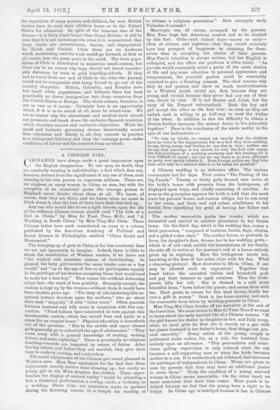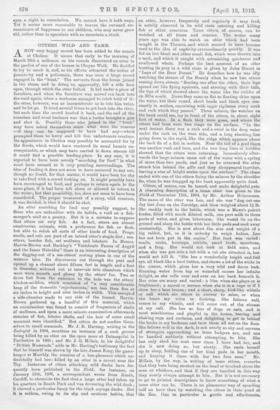A CHINESE GIRL.
CHINAMEN have always made a great impression upon the English imagination. To our eyes, no doubt, they are comically wanting in individuality; a fact which does not, however, detract from the significance of any one of them, each seeming in his own person to represent millions. There are, we suppose, as many women in China as men, but with the exception of an occasional queen the average person in England never thinks about them at all. We know, of course, that they are there, and we know, when we come to think about it, that the best of them have their feet tied up. Any one who would like to see a light thrown upon the life of the ordinary Chinese woman should read " The Life of a Girl in China," by Miss Li Yieni Tsao, M.D., and "A. Wedding in South China," by Miss Ying-Mei Chun. These Chinese ladies have each contributed an essay to a volume published by the American Academy of Political and Social Science at Philadelphia entitled " China Social and Economical."
The bringing-up of girls in China is far less irrational than we are apt ignorantly to imagine. Indeed, there is little to shock the sensibilities of Western readers if we leave out "the wicked and senseless custom of foot-binding. In general the baby girl receives the same tender care as a boy would," and " up to the age of five or six participates equally in the privileges of her brother excepting those that would tend to make her a tom-boy." Then comes the artificial deforming of her feet—the mark of true gentility. Strangely enough, the custom is kept up by the women—without them it would have been obsolete years ago. " The duty of administering this un- natural torture devolves upon the mothers," who go about their task " doggedly" if with " bitter tears." Often quarrels between husband and wife occur in connexion with this con- vention. "Fond fathers have interceded in vain against this invulnerable custom, which has served time and again as a
cause for an unquiet house." Physical education is henceforth out of the question. " But in the middle and upper classes girls generally go to school till the age of adolescence." " They come away with a general knowledge of reading, writing letters, and some ciphering." There is practically no religious teaching—morals are imparted by means of fables. After leaving school, and before they are married, they give their time to cookery, sewing, and embroidery.
The social enjoyments of the Chinese girl sound pleasant in Western ears. Miss Tsao apologizes for the fact that these enjoyments usually involve some dressing up ; but surely no young girl i l n the West despises fine clothes. These oppor- tunities for display of natural vanity " would be attending a fair, a theatrical performance, a sewing circle, a birthday, or a wedding. Short trips are sometimes made to gardens during the flowering season, to a temple for worship, or to witness a religions procession." How strangely early Victorian it sounds !
Marriages are, of course, arranged by the parents. Miss Tsao begs her American readers not to be shocked by this fact. Girls—and indeed boys—marry so early—
often at sixteen and eighteen—that they would certainly have less prospect of happiness in choosing for them- selves than in accepting the choice of their parents.
Miss Tsao's intention is always serious, but her English is colloquial, and the effect she produces is often comic. " As parents would reasonably select a party of the same station of life and pay some attention to personal appearance and temperament, the youthful parties could be reasonably expected to give a blushing consent. The chief reasons why they do not protest and show so much insubordination as a Western youth would are, first, because they are young, and second, because they never had any one of their own choice in view. It is not Romeo and Juliet, but the story of the Tempest universalized. Both the boy and girl accept the other as the first love : as soon as they are united, each is willing to go half-way to meet the wishes of the other. In addition to this the difficulty to obtain a divorce further increases the mutual desire to live peaceably together." Here is the conclusion of the whole matter in the eyes of our instructress
"To sum up briefly, we cannot say exactly that the children have no voice in the engagement, but as a fact they have nothing to say, being young and having no one else in view ; neither can wo say that marriage is not sacred, for only the first wife enjoys the full privileges of a wedding ceremony and this binding tie is very difficult to annul ; nor can we say there is no love, although no party ever openly admits it. Even foreign critics say that lova does exist only in a manner that is to be taken for granted."
A Chinese wedding is an elaborate affair. The various ceremonials last for days. First comes "The Passing of the big Parade." Twenty or thirty gaily dressed men arrive at the bride's house with presents from the bridegroom, all displayed upon trays, and chiefly consisting of eatables. As soon as the procession appears the bride is told that she must leave her parents' house, and custom obliges her to run away to her room, and there wail and refuse admittance to her family, thus signifying her grief at leaving her father and mother.
The mother meanwhile packs her trunks, which are decorated and carried in another procession to her future home. On the third day, which is the wedding day, comes a third procession, " composed of lanterns, bands, flags, clowns, and a gilded sedan chair." The mother forces, or pretends to force, the daughter's door, dresses her in her wedding gown— which is of red—and, amidst the lamentations of her family, she sets off, to arrive at her journey's end at a house entirely given up to rejoicing. Here the bridegroom meets her, knocking at the door of her sedan chair with his fan. What a charming picture! How decorative is life in China, if one may be allowed such an expression I Together they kneel before the ancestral tablets and household gods and pay their honours to aged relatives. Then the bride- groom lifts her veil. She is dressed in a still more beautiful dress, "bows before the guests, and serves them with tea. Eaoh guest, in return for this kind favour, hands her over a gift in money." Such is her home-coming and such . the reasonable form taken by wedding presents in China.
Miss Chun breaks off her narrative at the end of the festivities. We must return to Miss Li Yieni Tsao if we want to learn about the early married life of a Chinese matron. "If the girl knows her duties as daughter-in-law, and fully recog- nizes, as most girls do, that she is merely on a par with her junior husband in her father's home, then things can pro- ceed smoothly." Every action of the young couple is performed under orders, for, as a rule, the husband lives entirely upon an allowance. "This paternalistic and some- times galling supervision is only reduced when the son becomes a self-supporting man or when the bride becomes mother to a son. It is motherhood, not wifehood, that increases the privileges of independence in China. Wives are given to eons by parents that they may have an additional junior to serve them." Truly the condition of a young married woman in China seems unenviable. On the other hand, we must remember that their time comes. Hero youth is in- dulged because we feel that the young have a right to be happy. In China age is indulged because it has in Chinese eyes a right to consolation. We cannot have it both ways. Yet it seems more reasonable to ensure the outward cir- cumstance of happiness to our children, who may never grow old, rather than to speculate with so uncertain a stock.







































 Previous page
Previous page